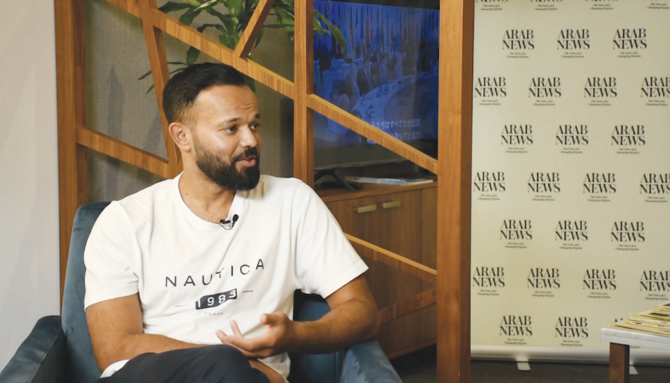DUBAI: Azeem Rafiq’s tale is one for the ages. It encapsulates the contemporary differences and tensions in British society, generating considerations that resonate across other societies in which cricket has a foothold.
The unfolding of his tale has been covered in previous columns. Revelations of racial abuse were first published in a cricket journal in 2020. These attracted the interest of a UK Parliamentary Select Committee in 2021, to whom Rafiq gave a harrowing public account of his experiences. After that, the England and Wales Cricket Board requested the establishment of an Independent Commission for Equity in Cricket. It reported in June 2023. Three months later, the ECB published its response.
In an interview conducted with Rafiq in the Arab News office in Dubai this week, he provided a candid opinion on the ECB’s response and related issues. His overall view is that the response is “flimsy and falls short of what is required.” When asked what is required, he has no doubt that the fundamental issues of systemic racism are still not being addressed with meaningful programs of change. He refers to a previous ECB report in 1999 on the same subject that was more specific in terms of what it would put in place. In over 20 years, he judges, there has been little progress, even regression.
The issue is, why? Rafiq talked about the forces of denial within society, about skilfully produced briefings made against him and others who have supported him, and of the death threats made against him and his family. These were instrumental in them relocating to Dubai, where he feels much safer.
Asked if he has regrets, he says none at all. He is strong in his faith, which has been a sustaining force. However, he admits to dark times with contemplations of suicide. Those responsible for bringing him to this pass really ought to be ashamed. It is doubtful that they are, wherein lies the problem.
In April 2024, the book which he has been producing with eminent cricket correspondent George Dobell is expected to be published. Rafiq anticipates that it will be an uncomfortable read for some. It seems to have been a cathartic experience for him, made none the easier by no end being in sight for his tale. There may be many who wish that it would end.
The book’s title, “It’s Not Banter, It’s Racism,” is bound to annoy the deniers, for whom it remains just that — banter to be taken in the spirit of dressing room humor and bonding. Such ingrained attitudes are difficult to shift and, from my experience, those who do try end up being branded as troublemakers.
Rafiq’s resilience is remarkable and impressive. Despite Shakespeare’s “slings and arrows of outrageous fortune” that continue to be hurled his way, he fights on. He feels he has a purpose in life, to make access to cricket and continued participation in it for young people of ethnic backgrounds easier and sustainable. He has schemes in mind. Funding is sought, not from established sources, but from private, altruistically motivated individuals and bodies.
There is a strong sense that Rafiq has a deep suspicion of the establishment. While the concept may be regarded as a nebulous one, in this case it relates to many of those who govern or have governed cricket in Yorkshire, England and Wales in the past two decades. In his view, they are the ones who have failed to address the issue of institutional racism, tried to brush the problem under the carpet, made platitudinous promises to bring about change, waited for the storm to die down and then reverted to type.
Many would have given up, kowtowed by the forces who feel that cricket has been wronged and are striking back. There is a deep vein of conservatism in British society that extends to cricket. Despite attempts to broaden the spectator appeal through initiatives in T20 and The Hundred formats, professional players are drawn largely from non-state schools and are mainly white. The problem is exacerbated by class.
According to historian Duncan Stone: “Class dictates everything about cricket in this country, in particular. It is woven into the culture of the game.” This dictates how it is organized and structured. As a result, swathes of the population do not get a chance to participate, most notably young people in state schools. The onus for developing young talent is forced onto local clubs. Some lack the financial or technical resources to achieve that, often precipitating their own collapse. A vicious circle of declining participation and institutional racism is not seen by everyone.
Azeem Rafiq, among others, does see it, and is driven to do something about it. Despite his sordid experiences in cricket, he still loves the game. His campaigning seeks to circumvent the formal channels, as he doubts their ability to achieve the changes that he believes are necessary. Hence, his lukewarm view of the ECB’s response to the damning conclusions of the ICEC report. He does give credit to the ECB’s commitments around women’s cricket and match-fee equalization.
Another commitment is to an action plan designed to increase the number of state primary and secondary school students playing cricket. The ECB also proposes to work with counties to redefine the talent pathway, aiming to ensure that finance is not a barrier to participation. While Rafiq accepts that these are steps in the right direction, he is skeptical that they will resolve his main concern, that of racial discrimination.
Challenging this is a huge task, striking at the fabric of British cricket and society, and not helped by current political trends. That does not seem to faze Rafiq. In his own words, he is “providing a voice for the voiceless” — those who are afraid to speak out or have no channel to do so. This puts him outside the mainstream. It will not be for lack of effort on his part if South Asians continue to experience discrimination when playing cricket.



























